Laboratory & Infrastructure
Robotic Platforms
The Robotics Laboratory stands at the forefront of technology, showcasing a diverse array of modern robotic equipment. Our extensive collection comprises over 30 robotics platforms, each meticulously equipped with a versatile range of multiple sensor and actuator devices. These robots operate seamlessly within the intricacies of the advanced distributed multi-robot architecture, aptly named S.A.M.U.R.A.I. (an acronym for "Sistema de Arquitecturas de Múltiples Robots Autónomos Integrados" in Spanish), exemplifying the pinnacle of autonomous and integrated robotic systems.
Five-bar linkage leg mechanism bipedal robot - Type I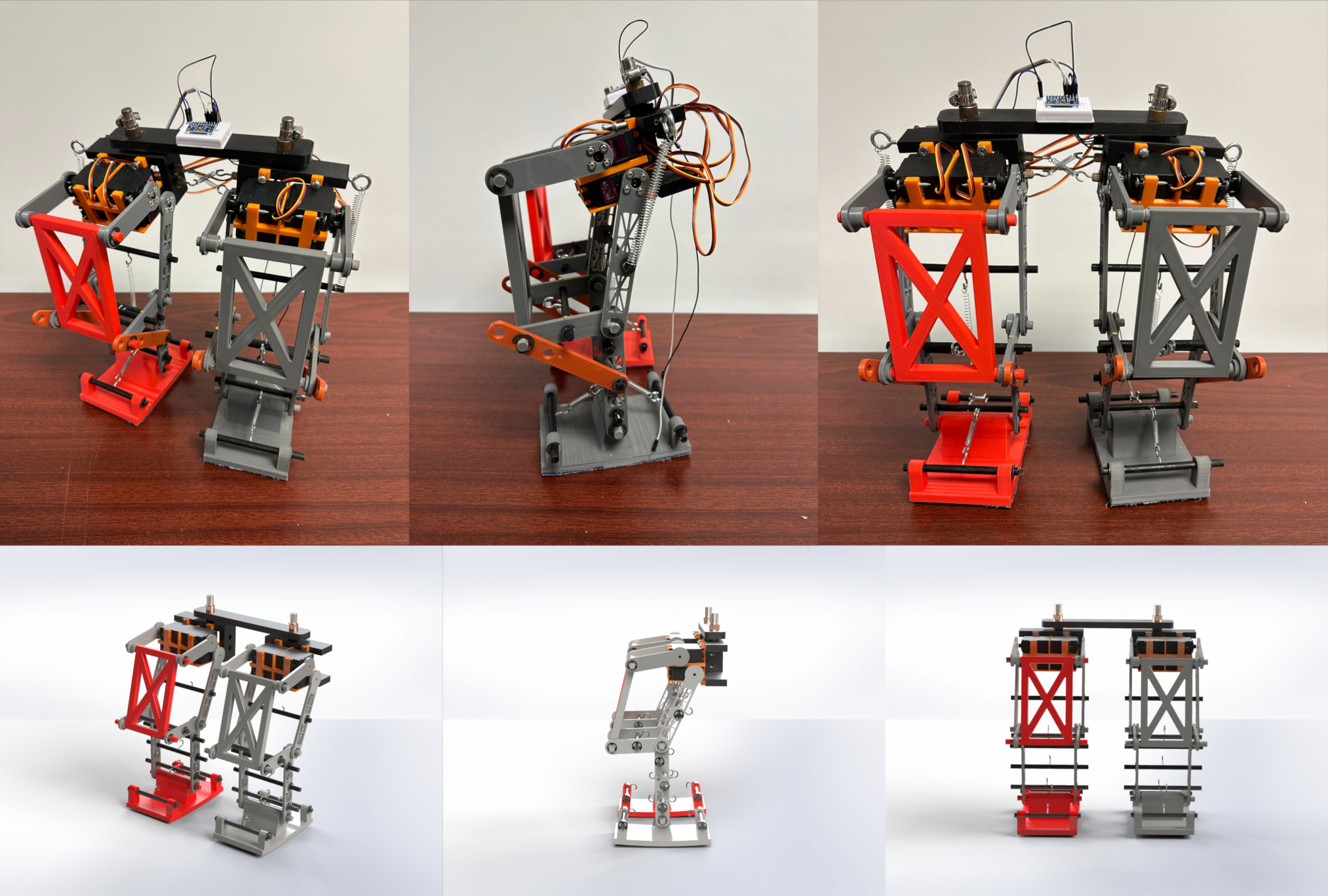
|
This is a bipedal robot whose lower limbs utilize a five-bar linkage mechanism as the primary kinematic structure for generating walking gaits. The robotic platform is instrumented with a 9-axis Inertial Measurement Unit (IMU) for attitude and motion sensing, and is actuated by multiple servo motors. Its control system is anchored by a Quad-core computer running Linux. The embeded system, is a multi-threading C/C++ software that calculate and execute a set of adaptive walking patterns based on five-linkage cycloidal trajectories (gaits). |
Five-bar linkage leg mechanism bipedal robot - Type II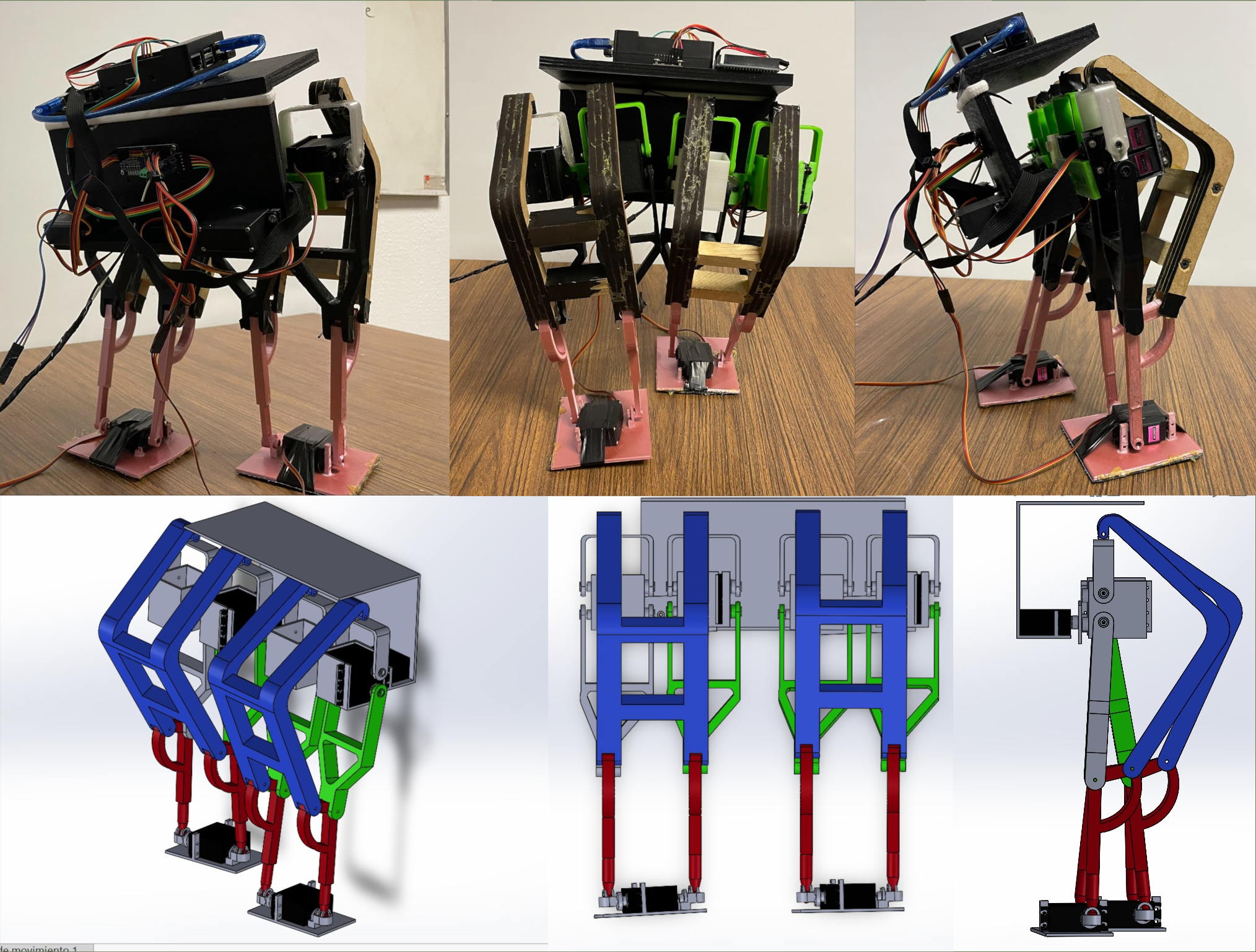
|
This is a bipedal robot whose lower limbs utilize a five-bar linkage mechanism as the primary kinematic structure for generating walking gaits. The robotic platform is instrumented with a 9-axis Inertial Measurement Unit (IMU) for attitude and motion sensing, and is actuated by multiple servo motors. Its control system is anchored by a Quad-core computer running Linux. The embeded system, is a multi-threading C/C++ software that calculate and execute a set of adaptive walking patterns based on five-linkage cycloidal trajectories (gaits). |
Five-bar linkage leg mechanism bipedal robot - Type III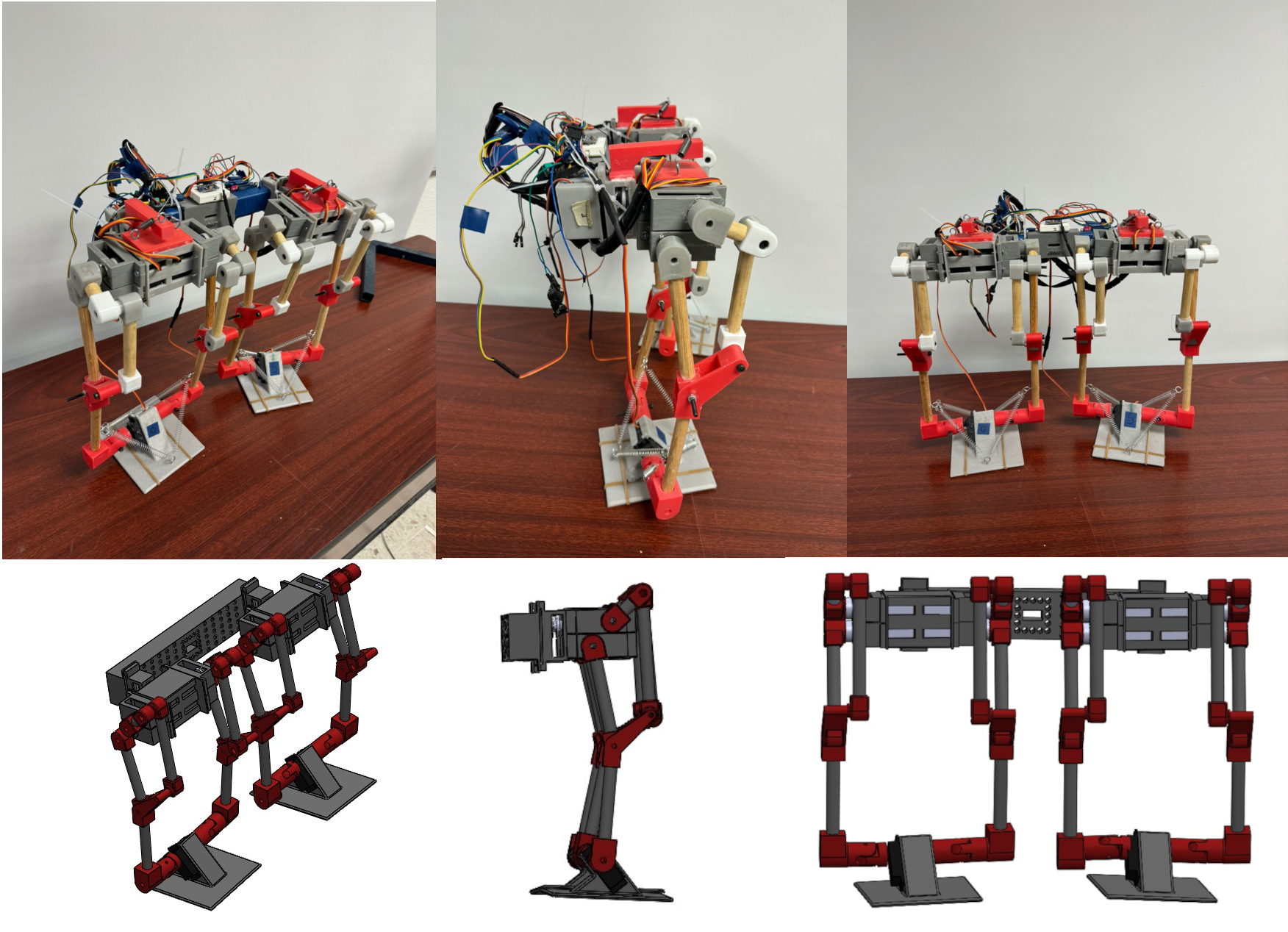
|
This is a bipedal robot whose lower limbs utilize a five-bar linkage mechanism as the primary kinematic structure for generating walking gaits. The robotic platform is instrumented with a 9-axis Inertial Measurement Unit (IMU) for attitude and motion sensing, and is actuated by multiple servo motors. Its control system is anchored by a Quad-core computer running Linux. The embeded system, is a multi-threading C/C++ software that calculate and execute a set of adaptive walking patterns based on five-linkage cycloidal trajectories (gaits). |
Five-bar linkage leg mechanism bipedal robot - Type IV
|
This is a bipedal robot whose lower limbs utilize a five-bar linkage mechanism as the primary kinematic structure for generating walking gaits. The robotic platform is instrumented with a 9-axis Inertial Measurement Unit (IMU) for attitude and motion sensing, and is actuated by multiple servo motors. Its control system is anchored by a Quad-core computer running Linux. The embeded system, is a multi-threading C/C++ software that calculate and execute a set of adaptive walking patterns based on five-linkage cycloidal trajectories (gaits). |
Lambda-Limb Biped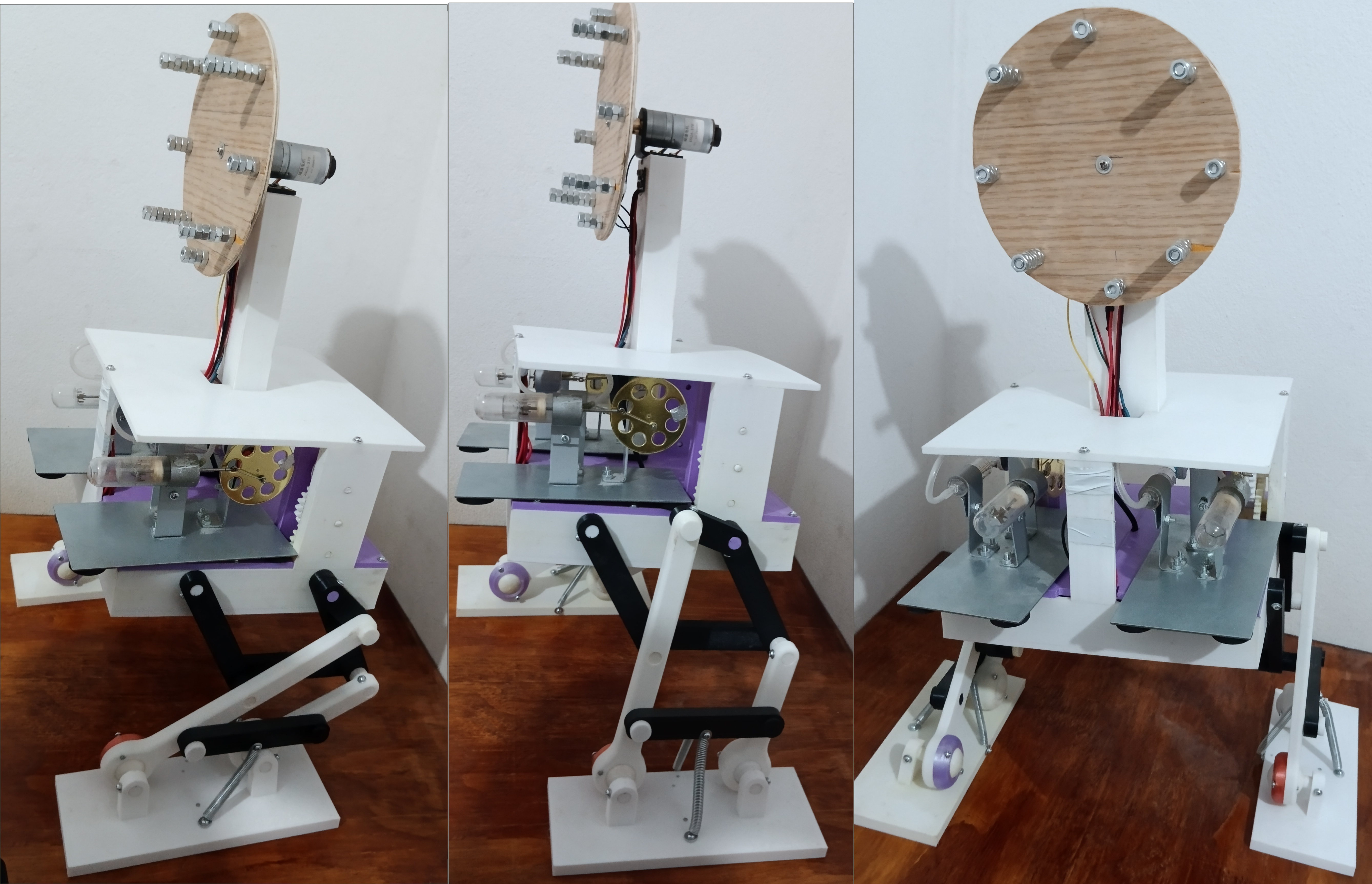
|
This bipedal walking robot is a home-made platform that features two lower limbs powered by Chebyshev-Lambda mechanisms. Each limb is uniquely propelled by a Stirling engine, heated by magnetic inductors. A key challenge arises during the single-support phase, when only one leg is in contact with the ground; the biped naturally tends to lose lateral balance. To counteract this, a reaction wheel, positioned in the robot's upper section, generates tangential forces through its rotation, effectively compensating for these intertial disturbances. Longitudinally, the broad surface area of the robot's feet helps prevent potential falls in pitch. The robot's onboard computer with a Linux kernel manages two primary functions: controlling the reaction wheel and digitally activating the electromagnetic heat inductor for the Stirling engines. |
Robotic Submarine
|
This is a laboratory-developed from scratch robotic submarine prototype. Its operation is rooted in Archimedes' Principle, precisely manipulating buoyancy and weight. The robot is equipped with magnetic gear speed reducers for both steering and forward propulsion. Its vertical movement is managed by a hydraulic piston system, which uses a home-made screw mechanism to displace a plunger, allowing for the intake of expulsion of liquid ballast. For sensing, the prototype integrates six underwater ultrasonic sensors, a 9-axis inertial measurement unit (IMU), a hydraulic pressure sensor, and an internal RGB-D sensor. All these systems are controller by a 64-bit computer running a Linux kernel. The robot has undergone successful testing for navigation and obstacle evasion, demonstrating reliable water resistance at depths of up to 10 meters. |
Reaction Wheel Self-Balancing Unicycle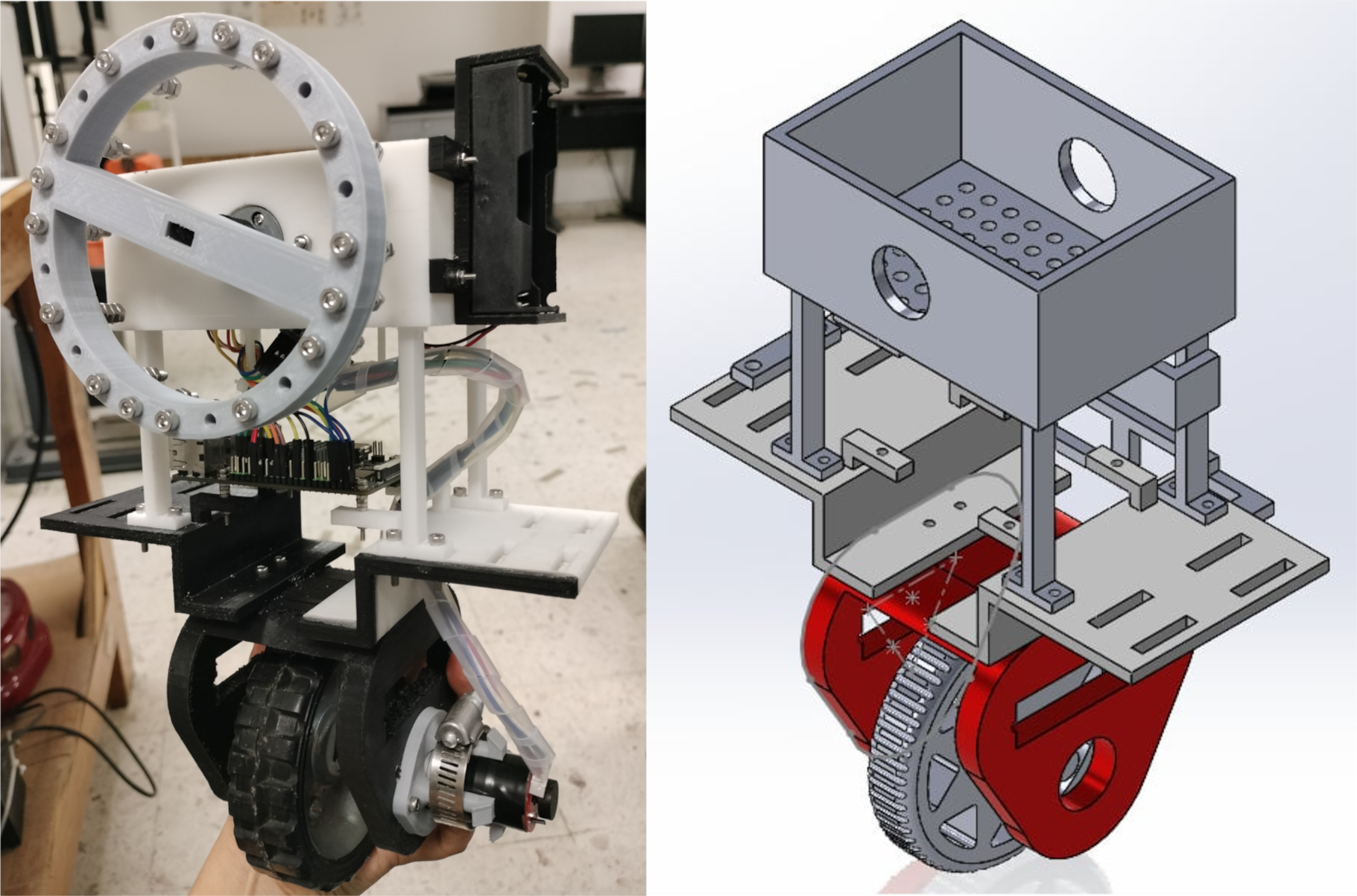
|
This unicycle robotic platform is a prototype fully designed and developed in our laboratory from scratch. It utilizes its traction wheel for dual purposes: not only for propulsion and navigation but also for achieving pitch autobalance, effectively functioning as an inverted pendulum. Complementing this, a reaction wheel is strategically mounted, rotating laterally to the robot's chassis. This wheel generates precisely controlled tangential forces to maintain roll autobalance, ensuring the robot's upright stability. To enable these advanced functionalities, the robot is instrumented with two motors equipped with pulse encoders for precise motion feedback. For comprehensive orientation and motion sensing, it integrates a 9-axis inertial measurement unit (IMU), and an RGB-D sensor provides detailed environmental perception. |
Self-Balancing Unicycle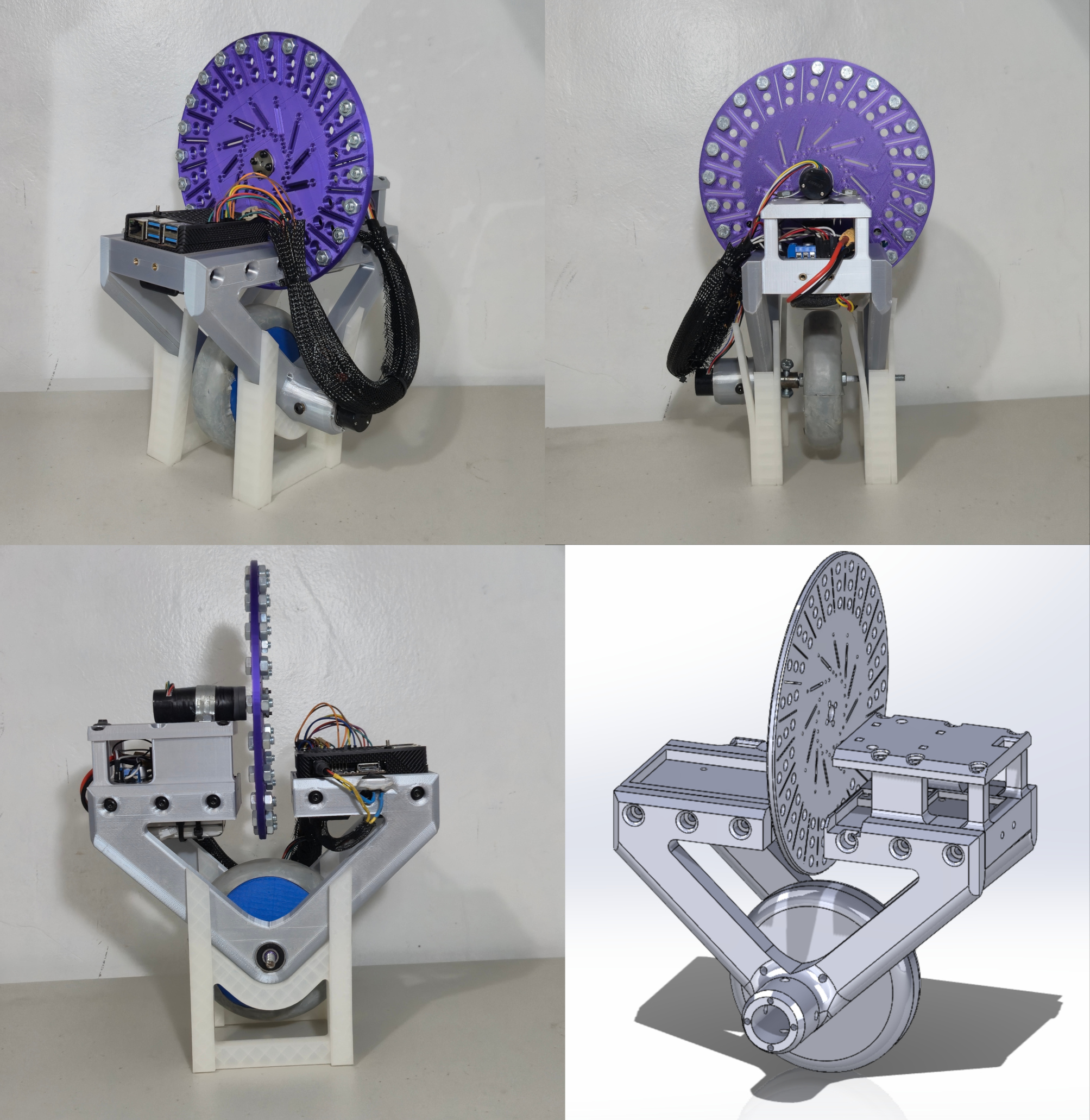
|
This unicycle robot, a completely in-house designed and developed laboratory prototype, features an optimized chassis geometry. Its traction wheel serves a dual purpose: it propels the robot for navigation and simultaneously achieves pitch autobalance, effectively functioning as an inverted pendulum. Additionally, a reaction wheel is strategically mounted to rotate laterally to the robot's chassis. This wheel generates precisely controlled tangential forces to maintain roll autobalance, ensuring the robot's upright stability. To enable these advanced capabilities, the robot is equipped with two motors that include pulse encoders for accurate motion feedback. For comprehensive orientation and movement sensing, it integrates a 9-axis inertial measurement unit (IMU). |
2WD Dynamic Self-Balancing Robot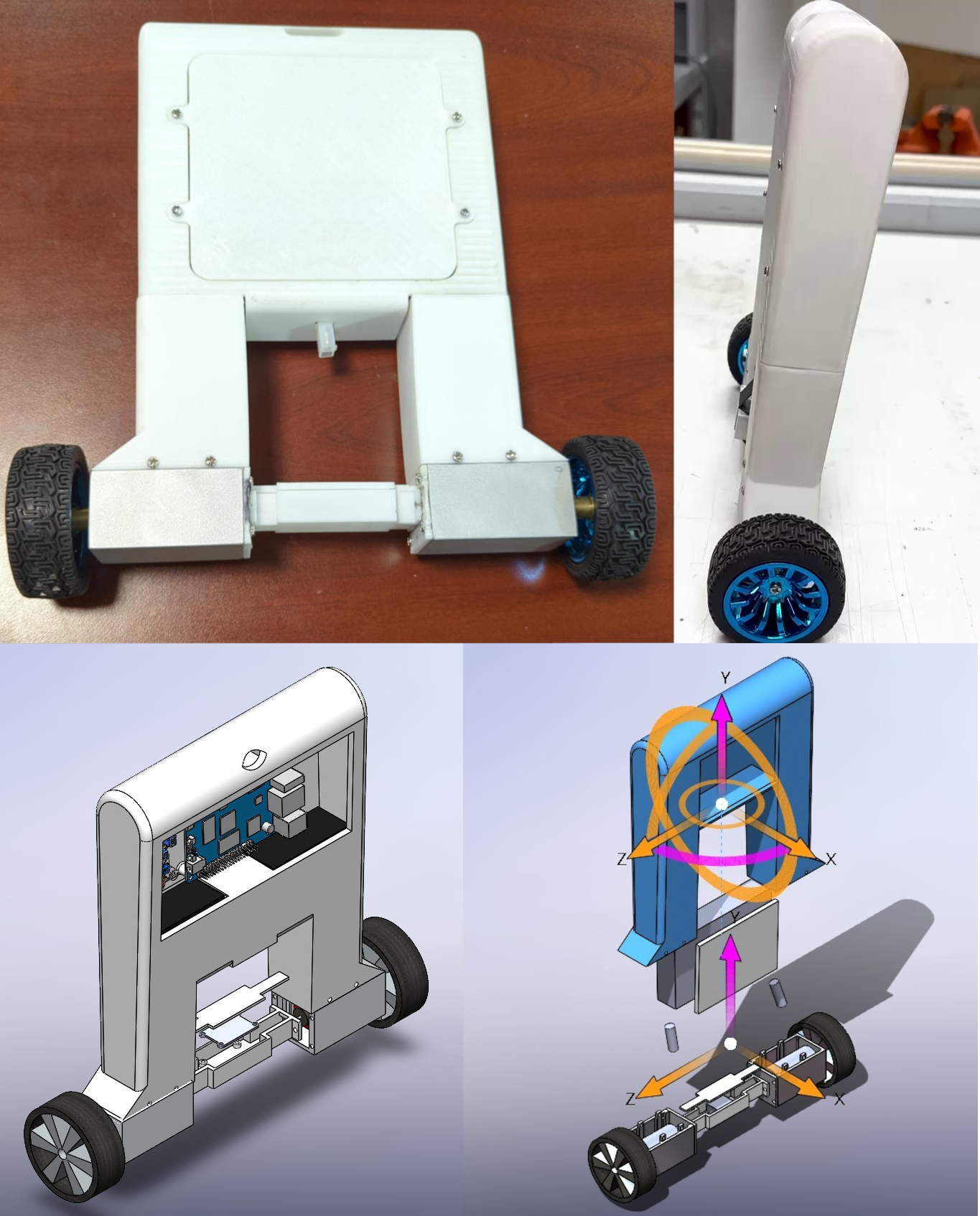
|
This is a home-made two-wheeled, self-balancing inverted pendulum robot platform, designed for combined autobalance and navigation through asynchronous control of its wheels. It was instrumented with two DC motors and pulse encoders for precise motion feedback, alongside a 9-axis inertial measurement unit (IMU) for comprehensive orientation sensing. Powering its operations is a 64-bit computer running a Linux kernel, with all its advanced autobalance and navigation control algorithms programmed in C++. |
Ornitopter Protoype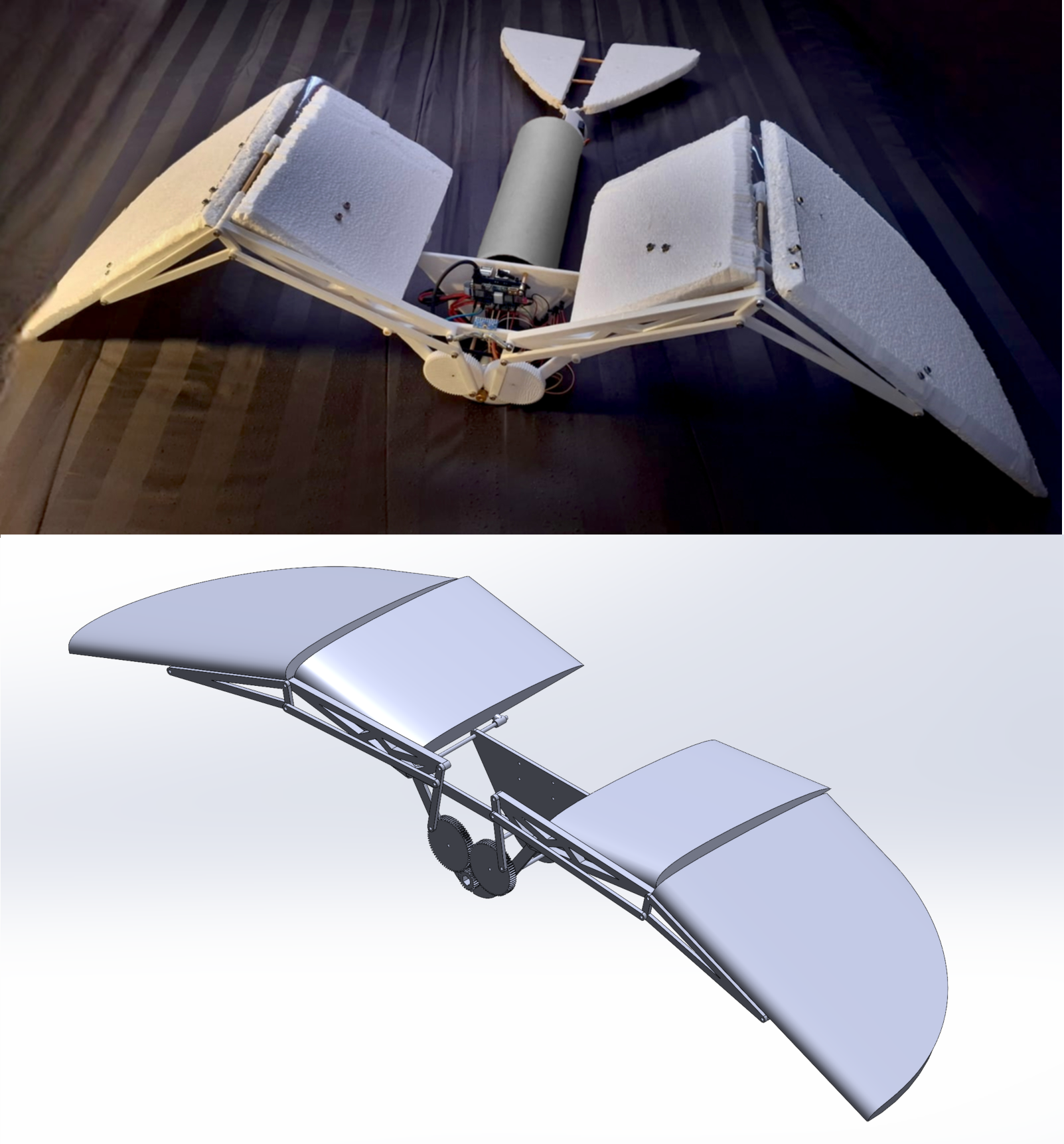
|
This bio-inspired, flapping-wing aerial robotic platform was entirely designed and developed in our laboratory. It features a DC motor with a pulse encoder for wing actuation, and a servo motor for rudder control at the ornithopter's tail. Additionally, an oscillatory mechanism with a speed reducer was designed specifically for the wings. The platform is instrumented with a 64-bit mini-computer running a Linux kernel, a 9-axis IMU, and a barometer. Its primary use is for designing flight mechanics control algorithms. |
Two Mechanum Wheeled Self-Balancing Robot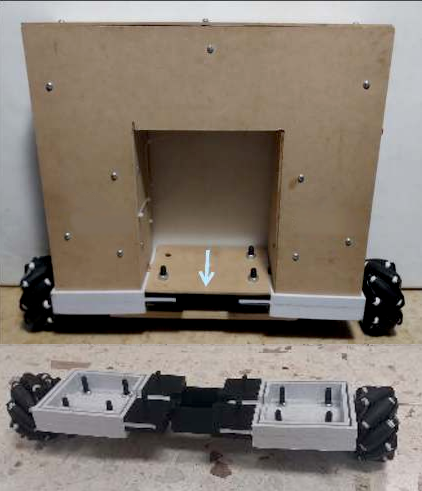
|
This is an in-house developed, two-wheeled, self-balancing robot utilizing Mecanum wheels. These specialized wheels feature rollers oriented at a 45-degree angle, laterally aligned, which impart unique kinematic behavior to the robot. The non-conventional motion equations describing the robot's movement on the ground enable it to achieve omnidirectional locomotion while maintaining self-balance. Powering the robot is a 64-bit computer running a Linux kernel. Its sensing and actuation systems include a 9-axis IMU and two DC motors equipped with pulse encoders. |
Reaction Wheel Self-Balancing Bicycle
|
This bicycle-type robotic platform, a complete in-house design and development from our laboratory, achieves stability and motion through user-defined control algorithms. It employs a traction motor for the rear wheel to provide propulsion, while a servomotor precisely steers the front wheel. For roll autobalance, a dedicated reaction wheel is integrated into the system. The platform's operation is supported by a 6-axis IMU for orientation sensing, encoders for accurate motion feedback, and a 64-bit computer running a Linux kernel to manage its control algorithms. |
2WD Self-Balancing Robot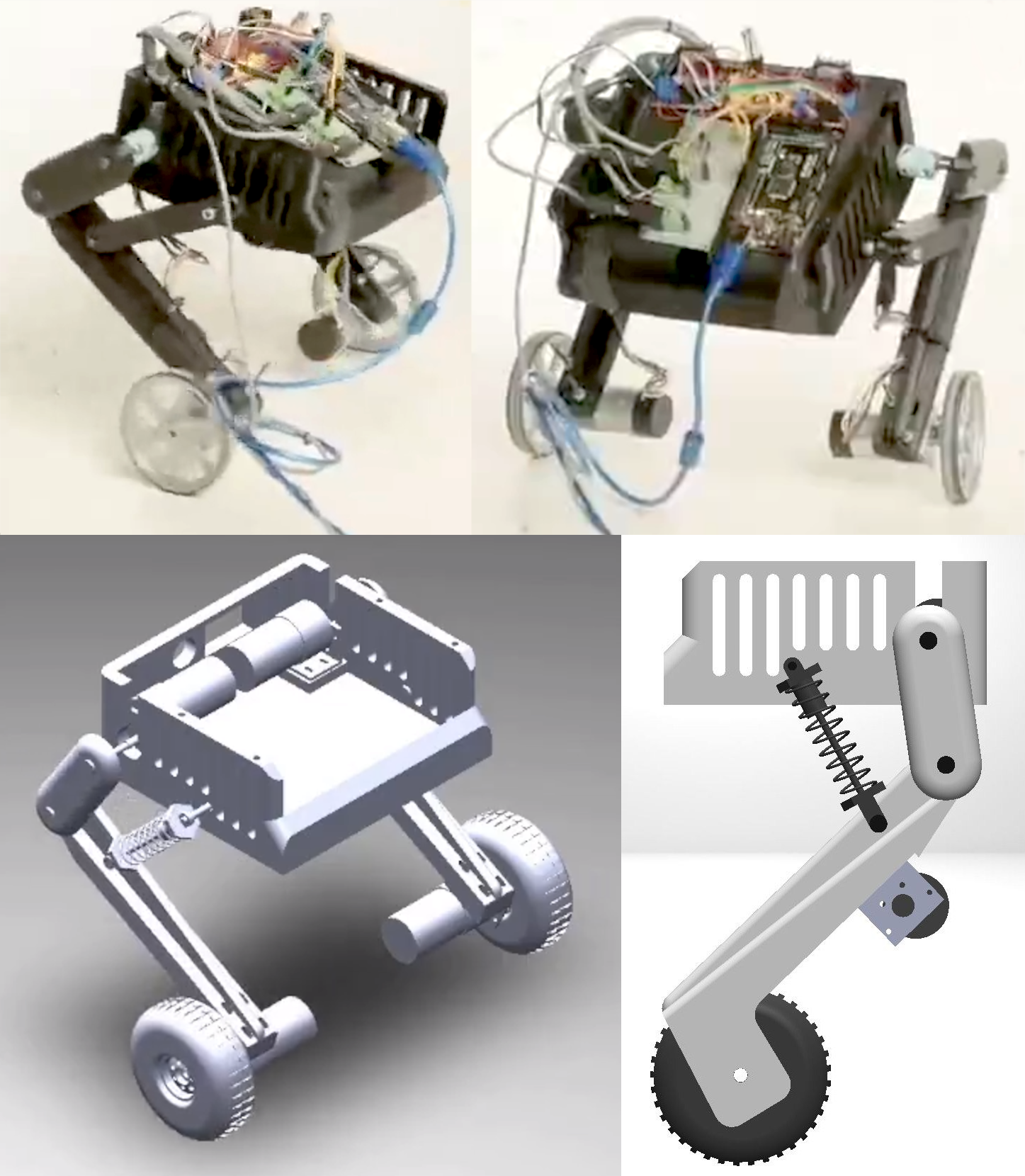
|
This is a 2W2D self-balancing platform equipped with active suspensions in its limbs, enabling it to adjust its height and/or evade tall obstacles. It is constructed with two side-mounted DC traction motors featuring encoders, and two additional DC motors specifically for controlling the active suspensions and/or altering the posture of its limbs, which are designed as four-bar planar mechanisms. The robot is instrumented with a 6-axis IMU and a 64-bit computer running a Linux kernel. Its control algorithms are coded in C/C++. |
Rolling humanoid
|
The humanoid-wheeled hybrid robotic platform represents a remarkable fusion of humanoid and wheeled locomotion, combining the versatility of both forms of movement. This creation is outfitted with a Phidget SBC3 computer, providing robust computational capabilities, and an SSC-32 servocontroller, enabling precise control over its servo motors. This didactic robotic platform seamlessly integrates the Phidget SBC3's computing prowess with the SSC-32 servocontroller's precision, resulting in a highly adaptable and responsive system. Whether navigating complex environments or executing intricate tasks, this platform exemplifies the synergy achieved through the convergence of computing and precise servo control. |
Rover A4WD1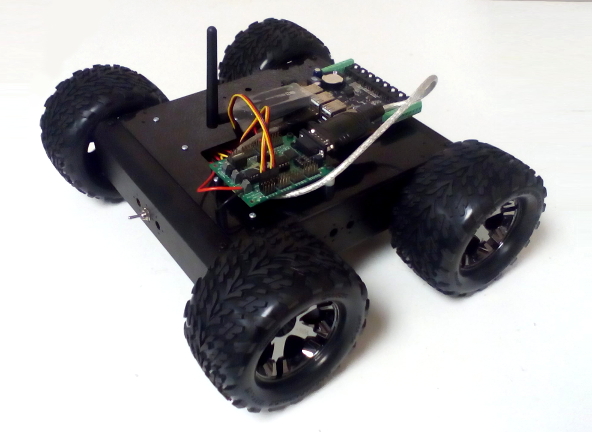
|
Aluminum 4WD1 Rover Mobile platform instrumented with a Phidget SBC3 computer, an SSC-32 servocontroller and two Sabertooth drivers. |
Hexapod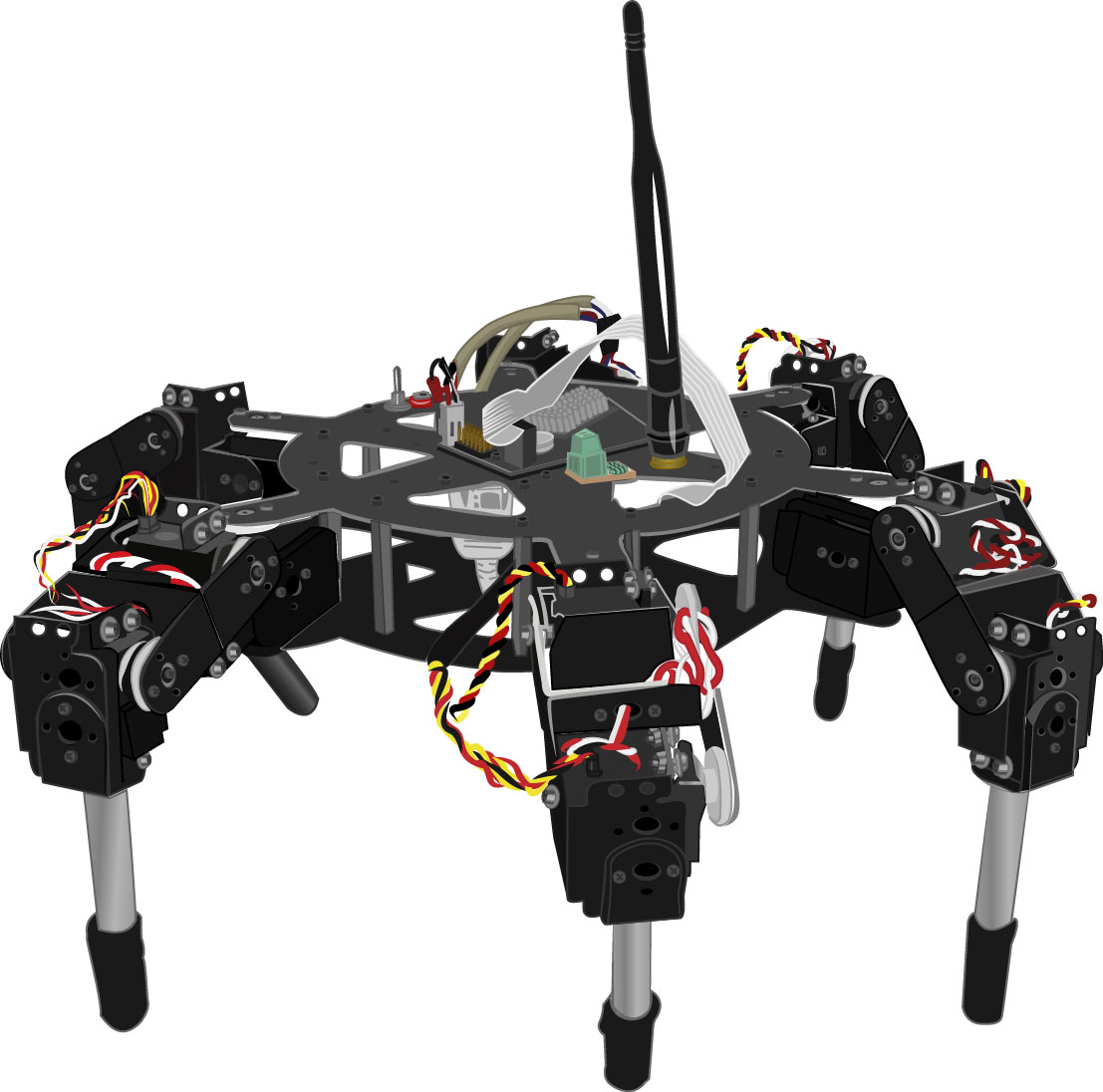
|
Hexapod mobile platform platform instrumented with a Roboard computer and an SSC-32 servocontroller. |
Apolo |
P3-AT Mobile Robotics teleoperable platform instrumented with two Unibrain Fire-i and odometric sensors. |
Orion |
A P3-AT platform equipped with a Kinect and an on-board computer. |
Venus |
P3-AT robotic platform instrumented with a Unibrain Fire-i camera. |
Akiles |
P3-AT robotic platform used mainly for teleoperation experiments. |
Hercules
|
P3-AT mobile robot equipped with a sensor suite, three Unibrain Fire-i for panoramic vision and two CMU for binocular vision. It uses a FPGA for data processing and numeric analysis, and a control board which allows communication with inertial sensors and actuators. |
Amigobots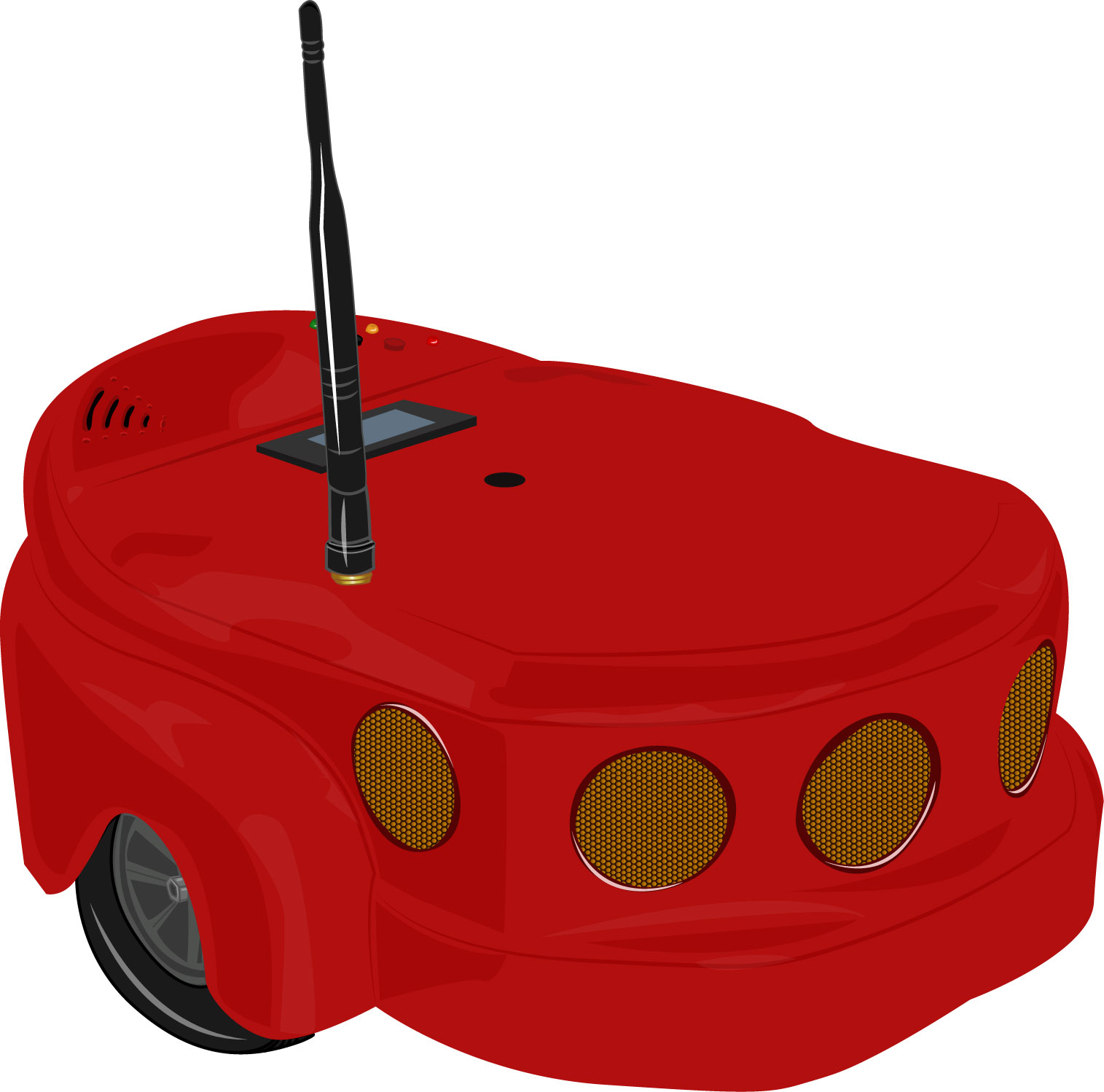
|
It's a team of ten mobile robots deployed for experimental assignments of Undergraduates Robotic's class. These robots are instrumented with a ring of eight ultrasonic sonar's, encoders and wireless technology. They are used for mapping and navigation experiments. |
Peoplebot
|
It's a mobile robot that has been instrumented with multiple sensors and capabilities such as LIDAR, pan-tilt camera, sonars, inertial unit, a touchscreen and a voice recognition system. |
Spherical Probe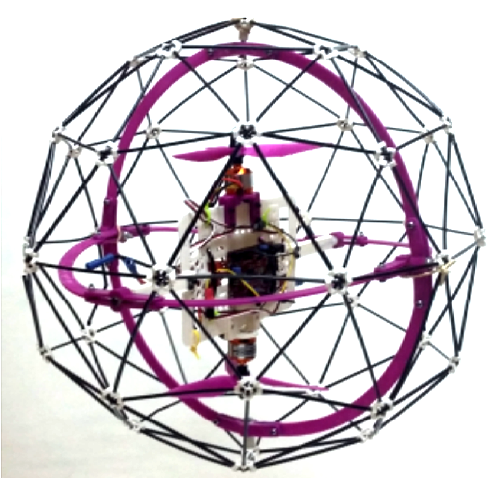
|
Spherical robot with an underactuated control of a dual-rotor. |
Rover 4W4D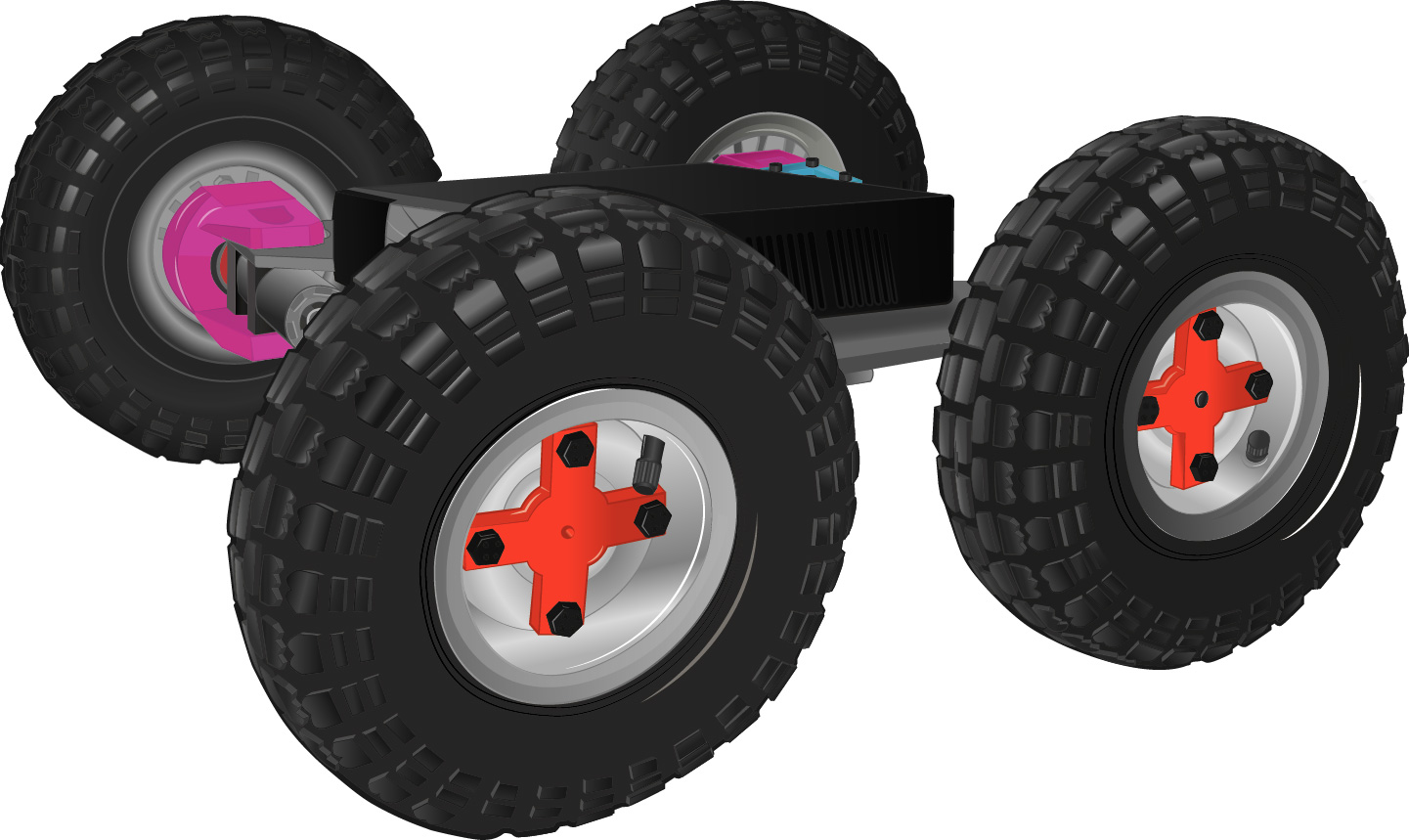
|
Home-made four-wheel, four-drive robotic platform with magnetic encoders. |
"Klann-Jansen" platform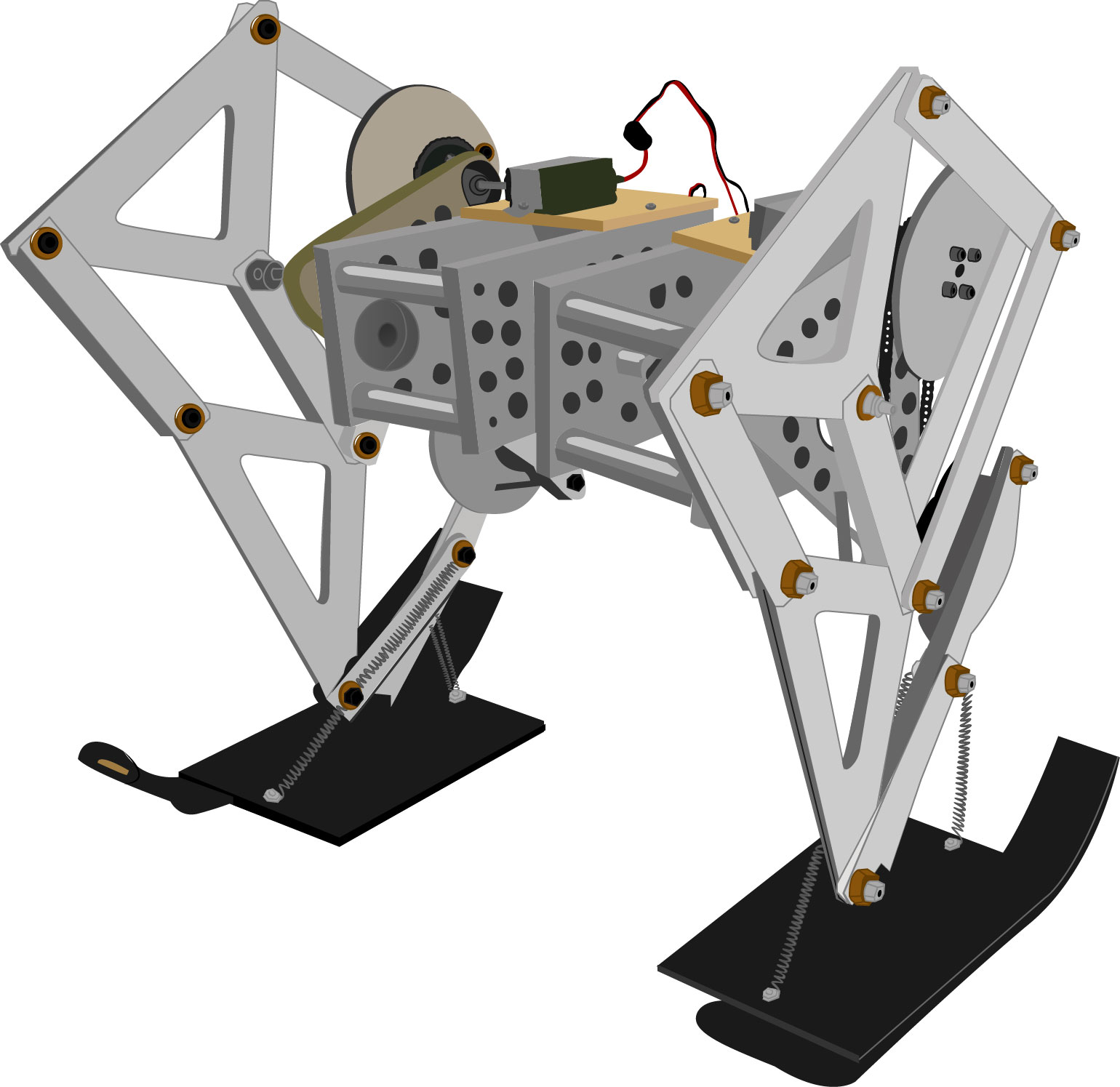
|
Home-made robotic platform based on a kinetic designs by Joe Klann and Theo Jansen. |
"Jansen" platform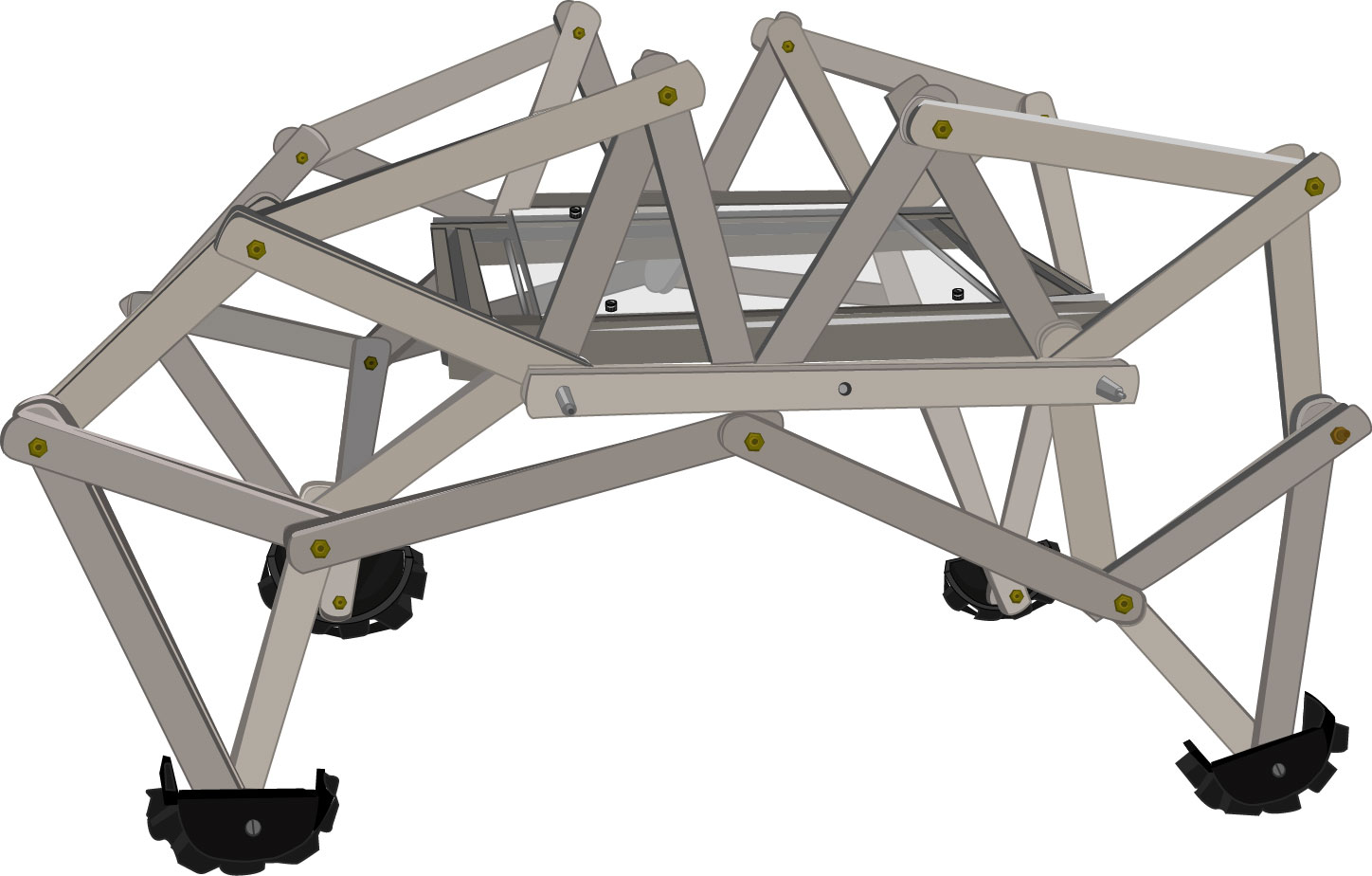
|
Home-made robotic platform based on a kinetic design by Theo Jansen. |
Quadruped platform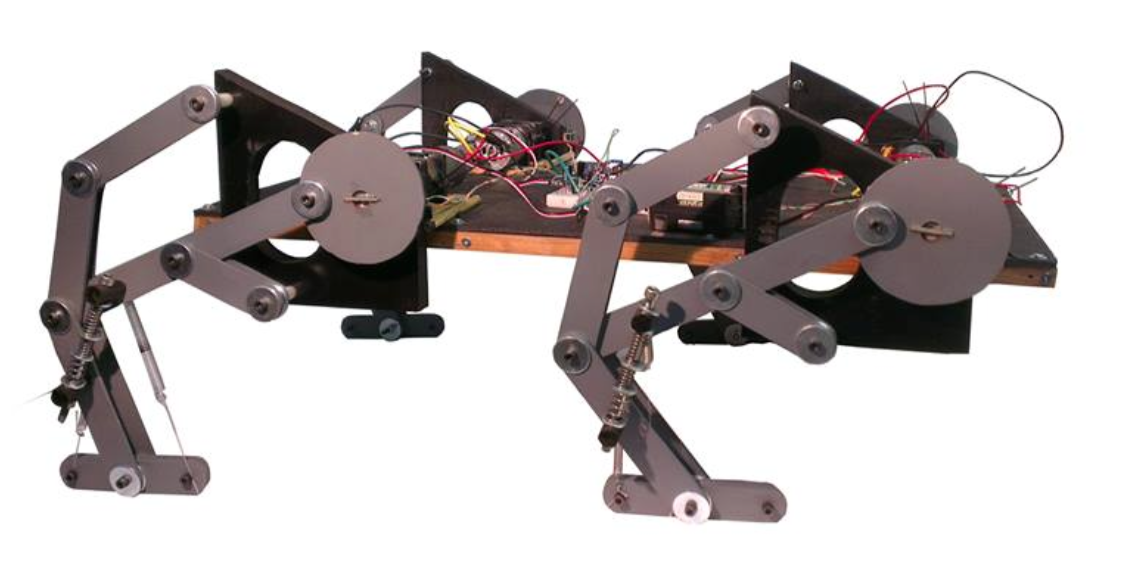
|
This robot is a home-made quadruped platform with underactuated legs based on Klann mechanisms. Its trajectory is controlled by a velocity-based control approach, which feedbacks speed through home-made low-resolution odometers of Hall-effect. |
Robbie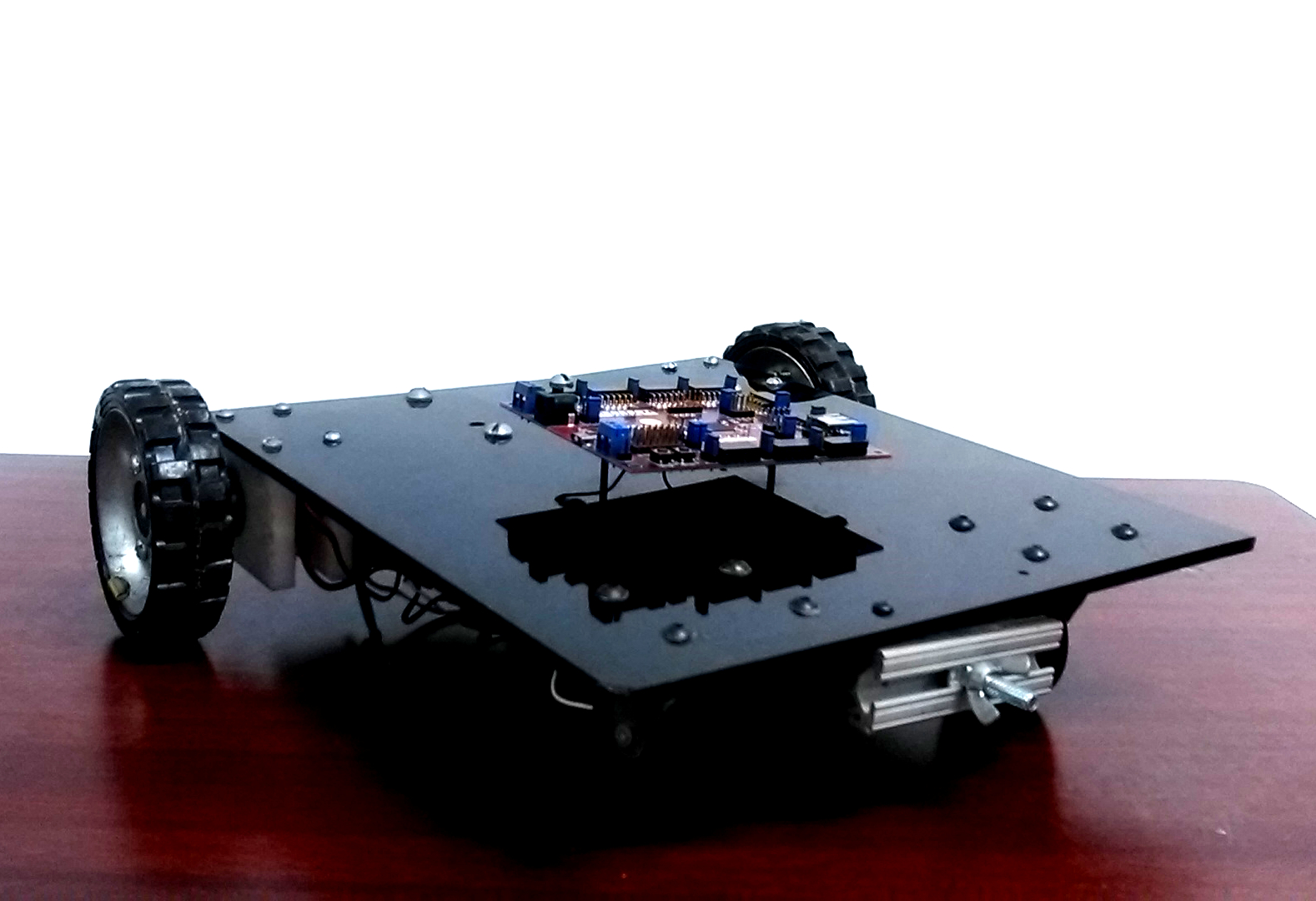
|
Home-made two-wheeled robot, with two crazy wheels and instrumented with a Cerebot 32MX4. |
Sensing Suite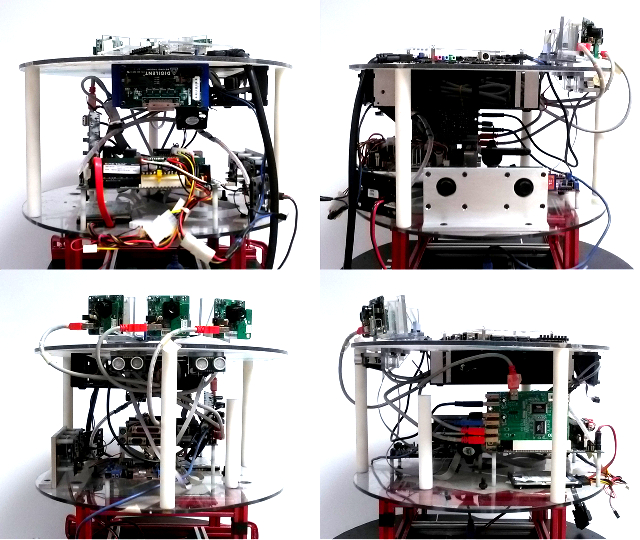
|
Sensor suite with three Unibrain Fire-i for panoramic vision and two CMU for binocular vision. It uses a FPGA for data processing and numeric analysis, and a control board which allows communication with inertial sensors and actuators. |
Robotic arms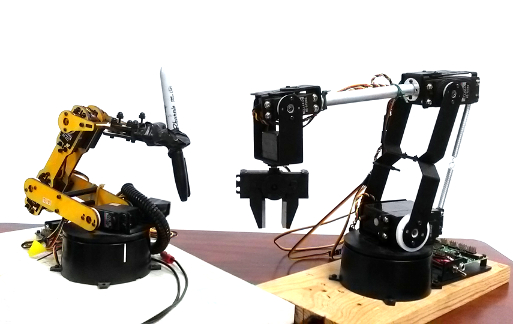
|
Home-made omnidirectional robotic platforms with circular shape. They use omni-wheels in order to move in any direction. With these platforms. Both arms are instrumented with an SSC-32 servo-controller,e one with USB connection and another with Serial. |
Doraemon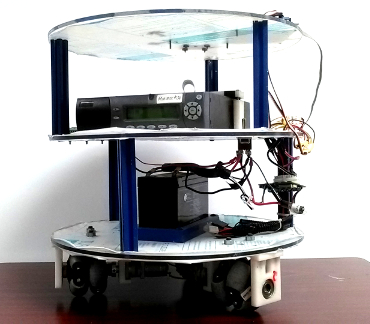
|
Home-made omnidirectional robotic platform with circular shape. Uses omni-wheels in order to move in any direction. Instrumented with a Mini-box computer and a Cerebot 32MX4. |
Astroboy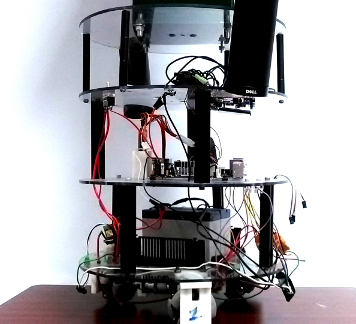
|
Based in its predecesors, it was created to interact with humans. As a three-wheeled-humanoid, this robot has two cameras that work as eyes, speakers and a microphone to communicate with people and reciev instructions, and inertial sensors. |
Omnibot type platforms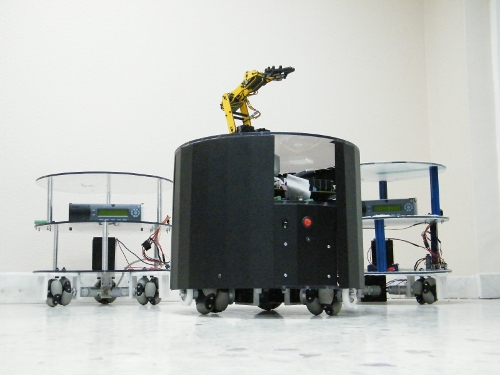
|
Home-made omnidirectional robotic platforms with circular shape. They use omni-wheels in order to move in any direction. With these platforms, we perform 3D monocular vision and control position tasks with inertial sensors. All three are instrumented with an Mini-box computer. Omnibot. It has a container and a water pump that has been used to develop irrigation tasks. In order to detect its targets, it uses a webcam. It also has a voice system that allows the robot to speak. Astroboy. Based in its predecesors, it was created to interact with humans. As a three-wheeled-humanoid, this robot has two cameras that work as eyes, speakers and a microphone to communicate with people and reciev instructions, and inertial sensors. |
Rover |
Home-made four-wheeled robot, its instrumented with a motherboard, inertial sensors and a web cam. It has the ability to return to its place when the batteries needs to recharge. |
FTCH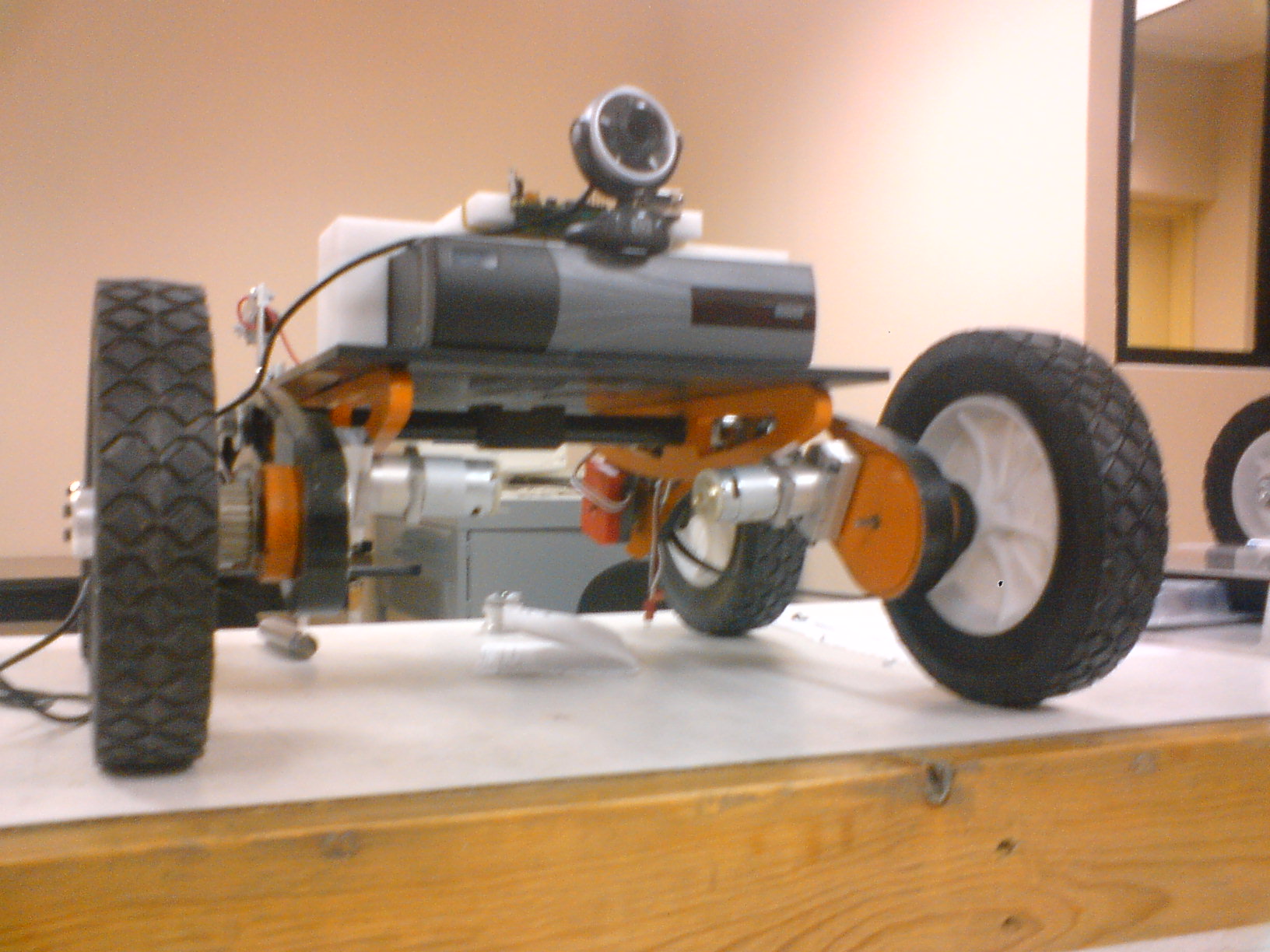
|
Home-made all-terrain robot used for localization purposes, its equipped with a Mini Box and a camera, which are managed by a motherboard. |
Popeye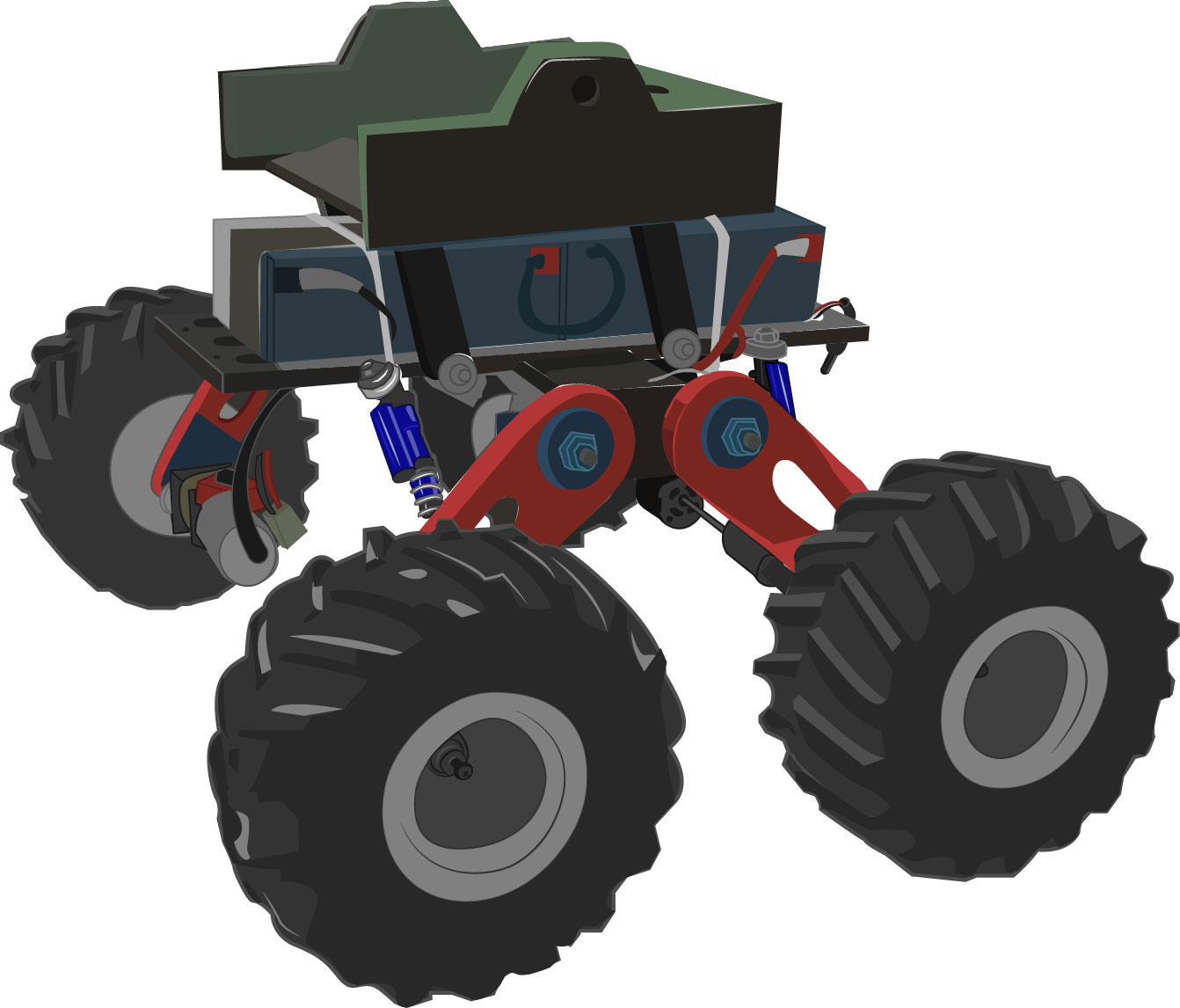
|
It is a 4WD all-terrain wheele mobile robot with independent spring-mass suspension system. Has been designed and deployed for skid steer trajectory control algorithms in outdoors. It's equipped with GPS, AD-HOC wireless technology, inertial units such as accelerometers, gyros, compass, etcetera. |
Yoshimpy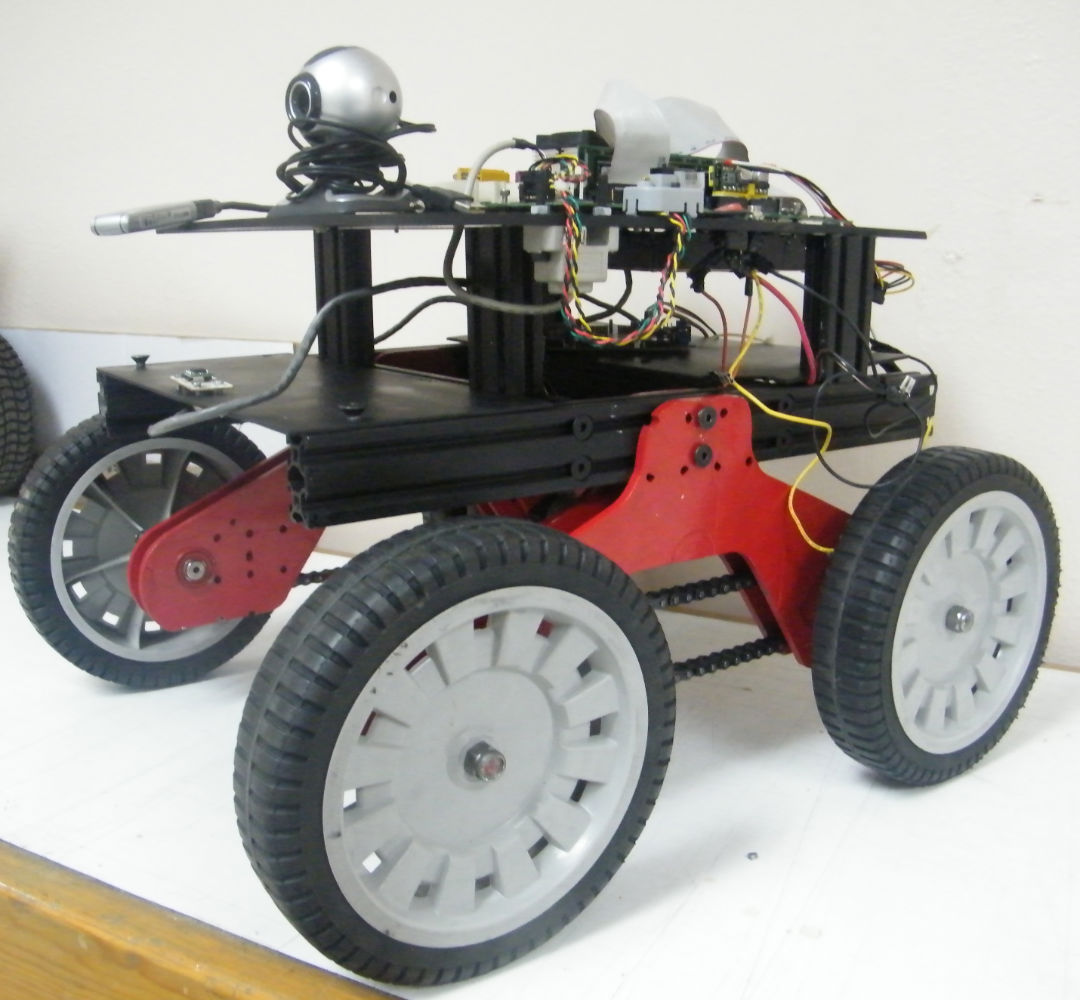
|
Home-made all-terrain platform made for localization and control position tasks. For this purposes has been equipped with inertial units and a vision sensor. |
Frankie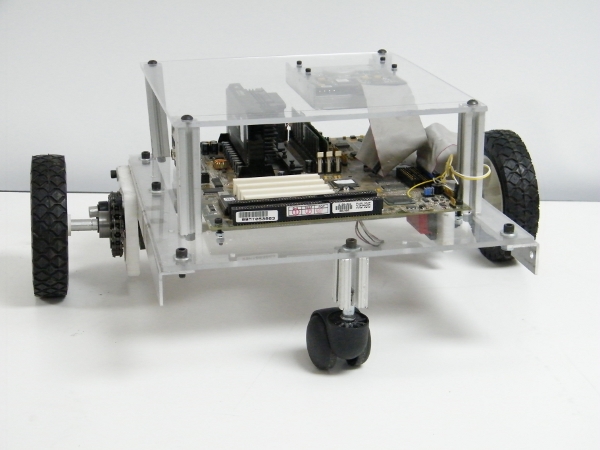
|
Home-made platform, with two wheels and a castor wheel. Instrumented with a LIDAR sensor and a Mini-box. |
Skybot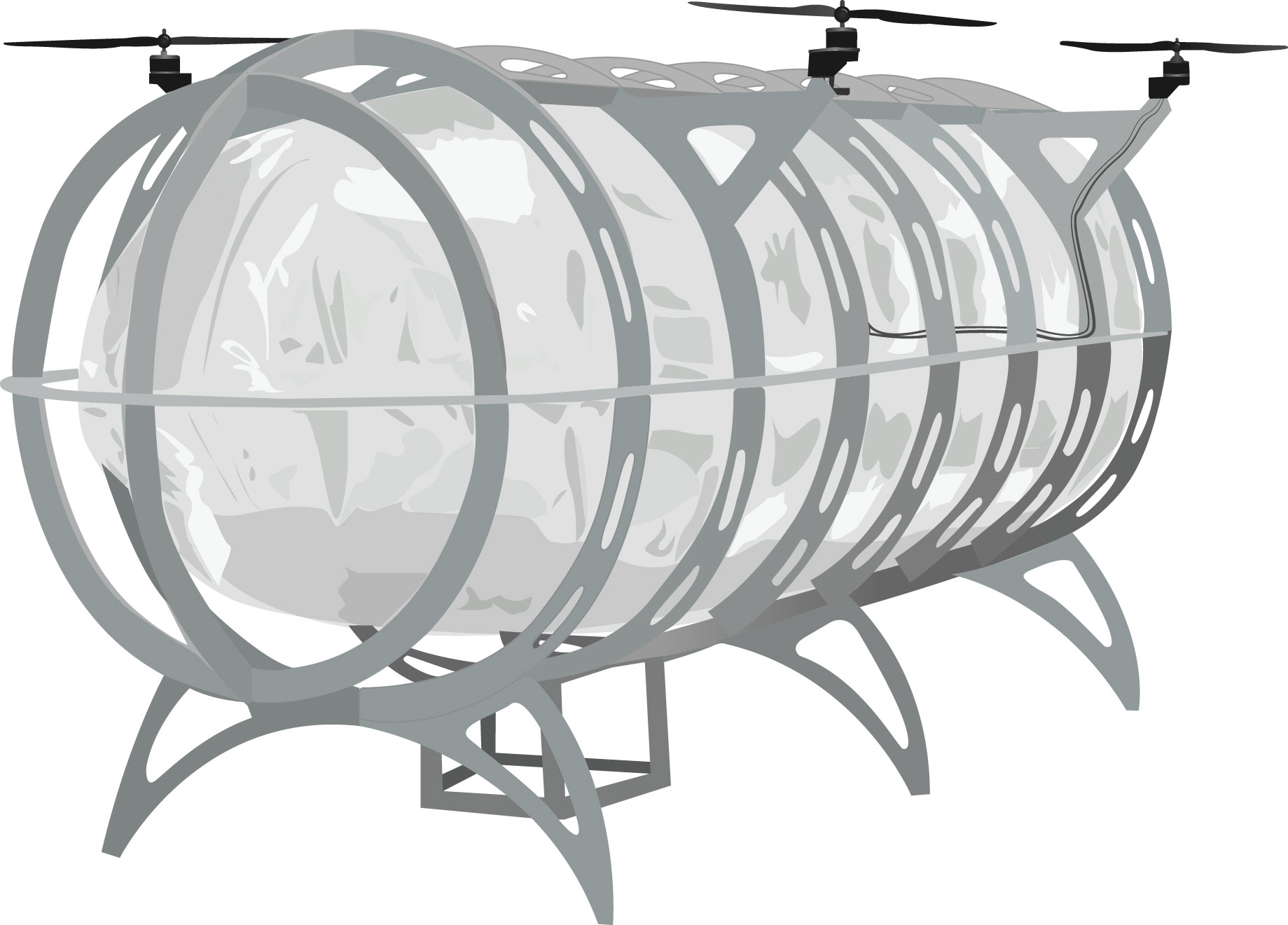
|
Home-made aerial robotic quadrator platform. Its made with a lightway material and a metalic camera filled with helium to help the platform to fly and stabilize. It has four mottors with propellers, a 28gr computer. This robot can be controlled with a GUI specially designed for it or with a joystick. |
Osunita |
Is a home-made differential control robotic platform deployed for control position and localization tasks. It has four wheels and is controlled with a netbook. It has a variety of sensors on it: a webcam, inertial sensors and a LIDAR sensor. |
Human-robot Interfaces
Computing
SAMURAI Arquitecture
|
Operating System for Distributed Robotic System named as SAMURAI (Sistema de Arquitecturas de MÚltiples Robots Autónomos Integrados. for its Spanish initials), and robotic KatanaLibs. The Katana Libraries were developed in the laboratory, and are used to manage a variety of sensors to accomplish robotic tasks such as: Vision, Teleoperation, Numeric Computing, Control, etc., in a Real-Time scheme. SAMURAI Meta OS Commands: https://www.youtube.com/watch?v=eGmHn1XTDK8 SAMURAI Meta OS Scripts: |
High Performance Cluster
|
Most of the tasks developed in the lab requires a high computing capacity, for this reason a high performance cluster has been configured in four of the lab's computers. This technique uses parallel computing by using labor division between the computer cores. In total, our 'Greek Island Cluster' is conformed of 24 cores, 16 are physical and 8 virtual. This cluster has allowed students to process information from all experiments at a greater rate, reducing the computing time. |